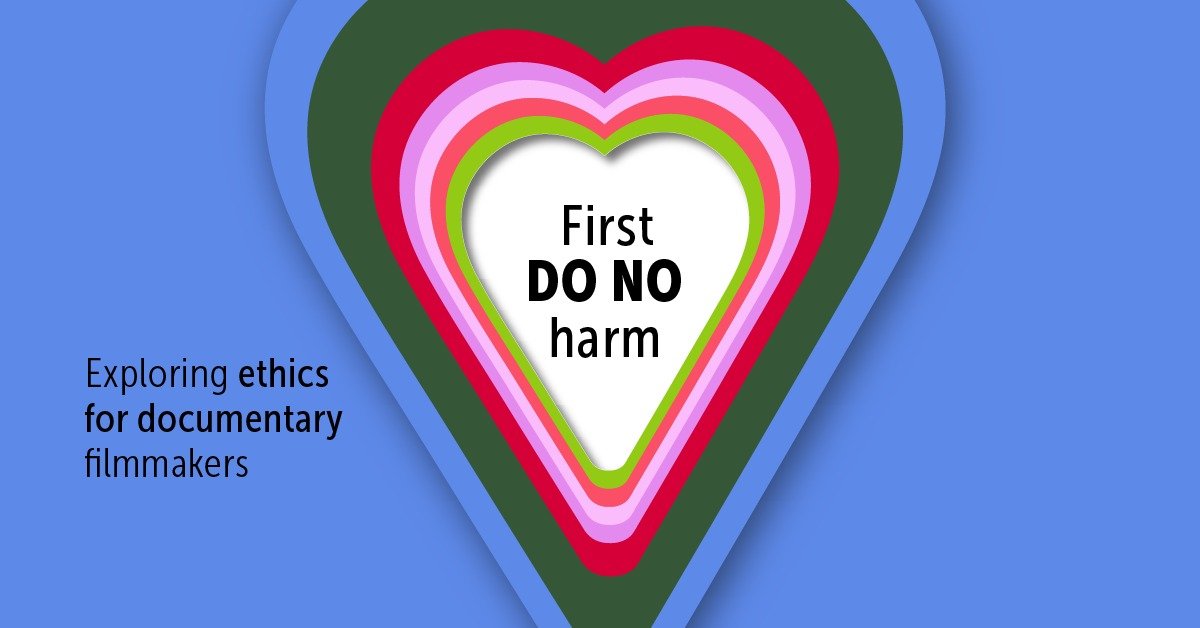The conscientious filmmakers’ guidebook with Sharon Ryba-Kahn
In 2022, a feature-length documentary called JIHAD REHAB screened at the Sundance Film Festival. The film’s subjects were men who had been released from Guantanamo Bay after 15 years to a Saudi prison where they were - according to the movie - being “rehabilitated” from extremism.
Written & Interviewed by Jess Sweetman
It prompted calls from a group of female Muslim documentarians who had previously been involved with the Sundance Institute, as well as complaints from Human Rights Watch, including questions about how exactly the (non-Muslim) filmmaker had gained such unfettered access in a country known for its silencing of dissenting voices? Why were men who had never stood trial for their crimes being unquestionably found guilty by the film? And, perhaps more urgently, the filmmaker was criticised for airing interviews with the subjects where they appeared to criticise the Saudi government, seemingly placing them in physical danger from their Saudi jailers.
The Guardian has an excellent deep dive into the film, the criticism, and how it was handled. Eventually Sundance apologised for screening the film as the public discussion turned to examining documentary ethics when it comes to authorship and subject.
In a 2009 study by the Center for Media and Social Impact at American University, “Honest Truths: Documentary Filmmakers on Ethical Challenges in Their Work,” 45 professional documentary filmmakers were interviewed about their approach to ethics in the field. The study concluded that most of the filmmakers believed strongly in “making informal commitments and employing situational ethics determined on a case-by-case basis.”
Or as New York Film Academy puts it: “As of now, there isn’t a specific documentary code of conduct for ethical standards, simply a floating version that most, but certainly not all, abide by."
As usual with anything to do with human beings - things are definitely more complicated than they seem and so, for a guide through such an ethical minefield I reached out to an experienced documentary filmmaker, who is also an academic, to see if she could offer a perspective on how a filmmakers can avoid doing harm to subjects while still making films worth watching.
Sharon Ryba-Kahn is a documentary filmmaker who is currently working on a PhD on Visualisations of Trauma in Documentary Films focusing on First Nations people in Australia. She also completed Masters degrees in Documentary Filmmaking as well as Visual Arts and Anthropology.
Her most recent documentary DISPLACED explores her personal story as a third generation Shoa (which is the Hebrew word for Holocaust) survivor. Sharon’s status as filmmaker/ academic seems to afford her a rich view of how documentary filmmaking works.
What’s more, while making DISPLACED, a deeply personal film in which she searches for her father and his history as a second generation Shoa survivor from Germany, Ryba-Kahn became the subject of her own documentary.
I ask her what is it like to transition from director to director/subject?: “It's actually the same thing as when you study filmmaking and they force you to act in your own films… so that you learn how shitty it can be to be badly directed!”
And has it illuminated her approach to working with subjects? “It reminded me of how a person chooses to share what they tell me in front of the camera. The minute what you say becomes public, it becomes performative. (It) is never an entire picture…And now that I'm working again with other protagonists…it makes me see their performance in a clearer way.”
Ryba-Kahn credits her studies of visual anthropology with shaping her ethical approach to documentary making: “I think very, very, very carefully about if I'm going to use a high angle or low angle on a protagonist, I really have to have a very good reason. Otherwise, I'll be always shooting at eye-level in interviews. So that they are shown as my equals and taken seriously.”
“I will always try to get an intimate aspect of my protagonist. Because it actually shows that I am seeing them, which is a way of translating empathy. And empathy means what can I do to make a person feel seen.”
Here, Ryba-Kahn acknowledges the clash that can emerge between telling a compelling story and ensuring the comfort of a subject. “In French we say “between two chairs” - trapped between two worlds. (That of the protagonist, sharing their truth, and) the industry that says you have to tell me a really sexy story.”
“If you are choosing to tell stories of protagonists that are in a safe place, you have to push them. And pushing them could come across as, ‘how far can you go?’ Those are questions that I face all the time.”
The dilemma between commitment to telling a compelling story and protecting the subject is age-old, since the moment NANOOK OF THE NORTH’s director replaced his Inuit hunter subject’s gun with a spear because the director wanted to tell a story of a more traditional existence. But the question takes a new poignance in the age of the Netflix mega-documentary. Driven by gripping stories, colourful characters, and emotive storytelling, stars such as TIGER KING, MAKING A MURDERER and THE JINX have driven an almost insatiable thirst for factual storytelling on streaming platforms.
Following this first wave of streaming documentary hits came a wave of data, identifying exactly where consumers are flocking, and the changes that this has brought to the industry as well as the art form. According to Reeve Wiederman, in an investigative report in Vulture in 2022:
“A genre that had always existed in part to inform and enlighten was now primarily a commercial product. That meant documentarians had more work, which was nice, but the projects often came with shorter deadlines and notes from streamers pushing directors to juice opening sequences with a little extra tension, as if these were spy thrillers that could be punched up rather than representations of real life.”
Ryba-Kahn’s films are, bytheir personal nature and independent means, more suited to the festival circuit than perhaps Netflix, however the need to balance an ethical approach to subjects against the need to tell a compelling story remains the same. In her current film, Ryba-Khan’s is working with refugees, a population of individuals who have faced severe trauma. How does she approach interviewing people who may be at risk this way?
“To what extent do I need to push them and ask them to re-traumatize themselves by telling me that story again?”, she muses, landing on: “I think that filmmaking can be therapeutic for protagonists. Because they can feel seen and heard if they're respected, and if they feel that what you are actually showing and portraying of them is them. And they can identify with it.”
“At the same time, that doesn't mean that you actually can protect them from being re-traumatized…(which is) very complicated because that moment of retraumatization could actually heal.”
At the end, Ryba-Kahn says, it’s about the communication methods she uses: “I have a tendency of asking everything three times at least: Are you sure about it? Are you sure you're okay with it? Positive? All of these little steps that can help to make them feel seen and protected. But in the end, they're alone with it and one has to acknowledge that.”
Working in partnership with protagonists means sharing the burden: “As an adult, you need to be responsible for yourself and see if this is what you want. I cannot take that responsibility…“Otherwise, nobody cares. And nobody will watch it, which is even worse. Because then you work for three years and then you're gonna have three people watch the whole thing.”
“This is going to be a dilemma I think you'll always have as a documentary filmmaker, (unless you have a story like Netflix’s THE TINDER SWINDLER, where it doesn't matter how it's shot, it'll work (because) the narrative is strong enough.”
But, in Ryba-Kahn’s point of view, the filmmaker and protagonist are not solely responsible for the work they are putting out in the world, she sees the public as consumers of narratives: “There is a lot of audience education that is missing, when will people actually care about seeing more subtle stories?” she asks. “It's not just about us filmmakers, it's really about educating the audience, which I find very, very difficult because politically speaking the industry is not helping us do that.”
Back to the Wiedeman article - he notes that the industry push for content has created an “identity crisis” an the industry that is as influenced by reality TV as it is by the Maysles Brothers:
“There is more money than ever, but it has come with expectations that didn’t exist when the industry was closer in ethics and taste to public broadcasting than to Hollywood.”
Ryba-Kahn, however, acknowledges that her films are not the same as the fare on Netflix. “I actually feel like lots of the films that I do may not have the strongest narrative, but then because they're emotional, people do want to see them. But of course they're small films, they're not big films. And then the narrative wins.”
“But,” she adds “I don't think that you can make films or art without the substance that hurts. Pain is part of life, right? Now, I don't want to put someone through pain, but I also tell their story because there is pain. Otherwise there is no story to tell.”
I ask her what her advice is for upcoming documentary filmmakers to consider before picking up a camera.
“The first question they should ask themselves is why are they telling the story? Are they the right person to tell that story? I think that that's probably the most important question you need to ask yourself. It's a very threatening question if you think of it. What if the answer is “I'm not?” That could happen. But then it gives you the sort of information you need to …become the right person to tell the story.”
Wise words indeed, especially in a cultural climate in which the film industry finally seems to be reckoning with its lack of representation all around the camera.
As Ryba-Kahn puts it in her next piece of advice: “make sure you actually understand and know why protagonists agree to make a film. You need to know the answer to that because it may very properly differ from you.”
And her last piece of advice? “Don't impose your narrative on your protagonist, otherwise, you're not making a documentary film…Don't change what they have to say, because once the film is done, they will feel disrespected.”




